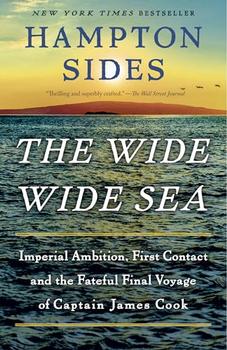Summary | Excerpt | Reading Guide | Reviews | Beyond the Book | Readalikes | Genres & Themes | Author Bio

Imperial Ambition, First Contact and the Fateful Final Voyage of Captain James Cook
by Hampton SidesExcerpt
The Wide Wide Sea
In recent years, the voyages of Captain James Cook have come under increasing attack as part of a larger reassessment of the legacy of empire. Cook was an explorer and a mapmaker, not a conqueror or a colonizer. Yet throughout history, exploration and the making of maps have usually served as the first phase of conquest. In Cook's long wake came the occupiers, the guns, the pathogens, the alcohol, the problem of money, the whalers, the furriers, the seal hunters, the plantation owners, the missionaries.
And so for many Native people across the Pacific, from New Zealand to Alaska, Cook has become a symbol of colonialism and of the ravages that came with European arrival. In many corners of the world, his name has been vilified—not so much for what he did, but for all the trouble that came after him. And also because the Indigenous peoples he encountered were ignored for so long, their voices rarely heard, their perspectives and cultural significance scarcely considered.
Over the past few years, monuments to Cook's explorations have been splattered with paint. Artifacts and artworks stemming from his voyages, once considered priceless treasures, have been radically reinterpreted or removed altogether from museum and gallery collections (in some cases, rightly returning to the lands from which they originated). The people of the Cook Islands have been talking seriously of changing the archipelago's name. In 2021, in Victoria, British Columbia, protesters toppled a statue of Cook into the city harbor. Cook, in some respects, has become the Columbus of the Pacific.
There was a time when Cook's three epic expeditions were seen by many as swashbuckling adventures—worthwhile and perhaps even noble projects undertaken in the service of the Enlightenment and the expansion of global knowledge. Cook sailed in an age of wonder, when explorer-scientists were encouraged to roam the world, measuring and describing, collecting unfamiliar species of plants and animals, documenting landscapes and peoples unknown to Europe. In direct ways, Cook's voyages influenced the Romantic movement, benefited medical science, bolstered the fields of botany and anthropology, and inspired writers ranging from Coleridge to Melville. The journals from Cook's odysseys were turned into best-selling books and became the impetus behind popular plays, poems, operas, novels, comics, even one TV show set in outer space. (Captain James Kirk of the USS Enterprise is widely thought to have been inspired by Captain James Cook.)
Yet today, Cook's voyages are passionately contested, especially in Polynesia, viewed as the start of the systematic dismantling of traditional island cultures that historian Alan Moorehead famously called "the fatal impact." Moorehead said he was interested in "that fateful moment when a social capsule is broken into," and Cook's expeditions certainly provided an excellent case study of the phenomenon. Taken together, his voyages form a morally complicated tale that has left a lot for modern sensibilities to unravel and critique. Eurocentrism, patriarchy, entitlement, toxic masculinity, cultural appropriation, the role of invasive species in destroying island biodiversity: Cook's voyages contain the historical seeds of these and many other current debates.
It was in the midst of this gathering antipathy toward Cook that I began to research the story of his third voyage—the most dramatic of his journeys, as well as his longest, both in terms of duration and nautical miles. It seemed a good time to try to reckon with this man whose rovings have stirred so much acrimony and dissension. It was curious to me: Other early European mariners who had crisscrossed the Pacific—Magellan, Tasman, Cabrillo, and Bougainville, to name a few—don't seem to generate so much heat or attention. What is it about Cook that has singled him out?
Excerpted from The Wide Wide Sea by Hampton Sides. Copyright © 2024 by Hampton Sides. Excerpted by permission of Doubleday. All rights reserved. No part of this excerpt may be reproduced or reprinted without permission in writing from the publisher.
Your guide toexceptional books
BookBrowse seeks out and recommends the best in contemporary fiction and nonfiction—books that not only engage and entertain but also deepen our understanding of ourselves and the world around us.